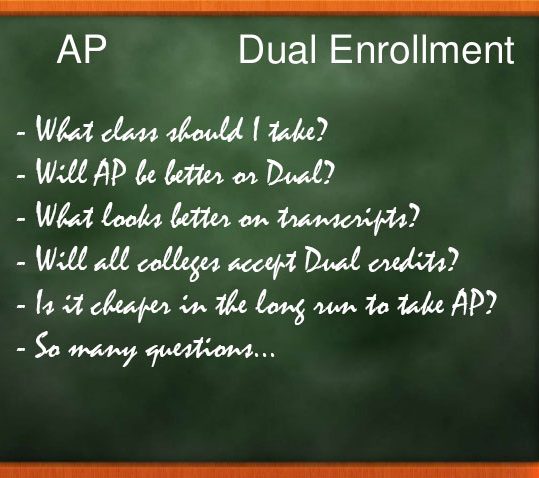AP vs Dual Enrollment

September 10, 2019
Signing up for classes is usually something that you pay no mind to; you sign up for whatever will get you the credits you need, and maybe something that sounds like it won’t be so much of a drag. However, for high-achieving students, choosing your classes is more like a process than anything else. Should you take that extra honors or AP class? Will the classes you choose have too much of a workload? How will these classes look to colleges? Should you take that dual class for college credit, or should you take that AP class to show that you’ve pushed yourself and can apply all that you’ve learned?
AP or dual is a dilemma that most honors students have to face. For example, when they get to Junior year, they have to choose whether they’d do ENH 110 or AP Literature and Composition. So when it comes down to AP vs dual, which is really the better class for you to take?
There are pros and cons to weigh when you make your choice. One thing most students consider when deciding between the two is their difficulty. For this criteria, AP clearly seems to be the harder option.
“The two classes are different, but AP is more rigorous than dual enrollment,” Ms. Borchers, an ENH 110 teacher here at Ridge, states. “This is specifically because dual enrollment courses are meant for all students whereas AP is intended for more advanced students.”
AP courses are aimed specifically for advanced students. If you have always been an honors student and plan to continue that trend throughout high school, then AP might be the way to go. However, if you’re more interested in taking a class that will get you college credit, dual seems to be the option for you. At least, it is in regards to dual’s level of difficulty.
Something that the two course types have in common is that money is usually involved in both. To get credit for an AP class, you’ll have to pay for the AP test, and this is slightly less than $100. So, if you really want your AP class to count, you’ll have to pay that amount for each class. It’s good to keep that in mind when making your schedule. However dual is more expensive, costing you around $255 for 3 credits, and a fee of $15 per semester.
AP may be more difficult than dual, but it can be much cheaper per class.
On the topics of tests and credits, it should be kept in mind that the AP test has much higher stakes than a dual enrollment class.
“Some kids take dual because they know it’s almost a guaranteed college credit. With AP, you only get the college credit if you pass the AP exam,” states Mr. Sabel, an AP English teacher at Ridge.
You must pass the AP test to earn credit for the whole course. So, even if you did well during the school year, you have to make sure that you do well on the test. Whereas for dual, you are guaranteed college credit, as long as you pass with at least a C.
Besides the lower stakes of dual enrollment classes, there are some more advantages to dual. The most obvious one being that you can complete college credits in high school, potentially shortening the amount of time you’ll spend in college. In a way, you’ll actually be paying a much cheaper cost for college credit than if you went to a typical American university. But, AP can be helpful with college as well.
“…these courses [AP] prepare you for college level work where much of the learning is placed back on the student as their responsibility,” says Mr. Rosinbum, one of our school’s AP US History (APUSH) teachers.
In the end, it’s not just about how these classes will look on your transcripts and how well they’ll prepare you for college. It’s more about you than anything else. Do you want something that’s not too difficult, but colleges will still happily welcome? Dual is your way, as long as you don’t forget about the cost of it! Do you want colleges to see that you are ready for a challenge? AP seems like the obvious choice; just remember you have to do well on the test or else it won’t count for anything! So, it all really comes down to your resources, your drive, and what you want when it comes to college. Don’t forget that it’s about you, so do what is best for you.
















Debbie Moore • Feb 18, 2021 at 6:55 PM
I love dual enrollment and it is GREAT for students!!
Brian Danielson • Dec 13, 2020 at 4:01 AM
Aileen,
There are a few concerns I have with your article. I raise these issues as a former teacher who now has a master’s in public policy. I am passionate about education reform.
First thing you should know is that schools love AP classes because they receive a financial incentive to do so. The College Board gives school districts a $9 per student per exam kickback. This could mean hundreds of thousands of dollars for school districts with large student populations. Many teachers also receive bonuses for the number of passing AP scores.
But there are many problems with the AP curriculum. Several universities have questioned AP curriculum as not being college level work. While the workload can be overwhelming, the classes themselves aren’t aligning with college standards. In 2013, Dartmouth College was concerned about giving AP Psychology students advanced standing so they gave those students a placement test. Unfortunately, 90% of students who scored a 5 on the AP exam failed the placement exam. Many colleges and universities no longer accept AP classes for advanced standing. This means you would still need to take a full 120 credits to graduate with a bachelor’s degree.
Dual enrollment was designed to help high academic achievers transition into college before high school graduation. Many school districts lose funding for these classes since the student isn’t physically at the high school. This is another reason why schools promote AP classes. But many school districts have cut deals with community colleges where the dual enrollment classes are taught at the high school, and in some cases by the high school teacher. This defeats the purpose of dual enrollment. In fact, dual enrollment’s rigor should be just as high as an AP class if we are to believe it to be college level work.
The purpose of public education is to prepare students for career and college readiness. Stats show that 59% of all students who take AP exams score a 3 or higher, and students who do dual enrollment outperform traditional first year college students taking the same classes. My research suggests that 25% of high school students are college ready by their junior year but are held back in high school.
I fully support allowing the top 25% of high school juniors and seniors to enroll full time in a community college and receive dual credit for high school graduation requirements. Since community colleges cost roughly half, or a third in some states, the cost to send you to high school, my policy proposal saves taxpayers $12.3 billion per year nationally while paying for an associate’s degree for the top 25%. This means lower taxes for your parents and very little student loan debt for the students.
But public schools won’t tell you this.